The Association for Progressive Communications (APC) is an international network of organizations that was founded in 1990 to provide communication infrastructure, including Internet-based applications, to groups and individuals who work for peace, human rights, protection of the environment, and sustainability. Pioneering the use of ICTs for civil society, especially in developing countries, APC were often the first providers of Internet in their member countries.
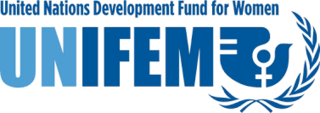
The United Nations Development Fund for Women was established in December 1976 originally as the Voluntary Fund for the United Nations Decade for Women in the International Women's Year. Its first director was Margaret C. Snyder. UNIFEM provided financial and technical assistance to innovative programmes and strategies that promoted women's human rights, political participation and economic security. Since 1976 it supported women's empowerment and gender equality through its programme offices and links with women's organizations in the major regions of the world. Its work on gender responsive budgets began in 1996 in Southern Africa and expanded to include East Africa, Southeast Asia, South Asia, Central America and the Andean region. It worked to increase awareness throughout the UN system of gender-responsive budgets as a tool to strengthen economic governance in all countries. In 2011, UNIFEM merged with some other smaller entities to become UN Women.

Charlotte Anne Bunch is an American feminist author and organizer in women's rights and human rights movements. Bunch is currently the founding director and senior scholar at the Center for Women's Global Leadership at Rutgers University in New Brunswick, New Jersey. She is also a distinguished professor in the Department of Women's and Gender Studies at Rutgers.

The Commission on the Status of Women is a functional commission of the United Nations Economic and Social Council (ECOSOC), one of the principal organs of the United Nations. CSW has been described as the UN organ promoting gender equality and the empowerment of women. Every year, representatives of member states gather at United Nations Headquarters in New York to evaluate progress on gender equality, identify challenges, set global standards and formulate concrete policies to promote gender equality and advancement of women worldwide. In April 2017, ECOSOC elected 13 new members to CSW for a four-year term 2018–2022. One of the new members is Saudi Arabia, which has been criticised for its treatment of women.
Sunila Abeysekera was a Sri Lankan human rights campaigner. She worked on women's rights in Sri Lanka and in the South Asia region for decades as an activist and scholar. Quitting a career as a singer, Abeysekera briefly joined the Janatha Vimukthi Peramuna and then founded the Women and Media Collective in 1984. As head of the INFORM Human Rights Documentation Centre, she monitored human rights violations by all parties in the civil war. She received the United Nations Human Rights Award in 1999 and the Didi Nirmala Deshpande South Asian Peace and Justice Award in 2013.
A human rights defender or human rights activist is a person who, individually or with others, acts to promote or protect human rights. They can be journalists, environmentalists, whistleblowers, trade unionists, lawyers, teachers, housing campaigners, participants in direct action, or just individuals acting alone. They can defend rights as part of their jobs or in a voluntary capacity. As a result of their activities, human rights defenders (HRDs) are often subjected to reprisals including smears, surveillance, harassment, false charges, arbitrary detention, restrictions on the right to freedom of association, physical attack, and even murder. In 2020, at least 331 HRDs were murdered in 25 countries. The international community and some national governments have attempted to respond to this violence through various protections, but violence against HRDs continues to rise. Women human rights defenders and environmental human rights defenders face greater repression and risks than human rights defenders working on other issues.
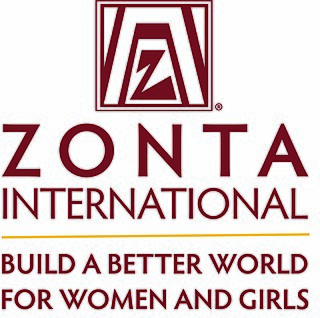
Zonta International is an international service organization with the mission of Building a Better World for Women and Girls, in support of Sustainable Development Goal 5.
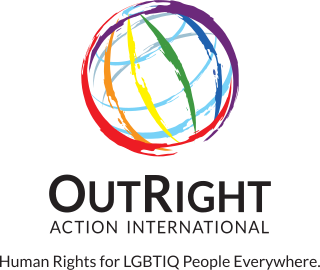
OutRight International (OutRight) is an LGBTIQ human rights non-governmental organization that addresses human rights violations and abuses against lesbian, gay, bisexual, transgender and intersex people. OutRight International documents human rights discrimination and abuses based on their sexual orientation, gender identity, gender expression and sex characteristics in partnership with activists, advocates, media, NGOs and allies on a local, regional, national and international level. OutRight International holds consultative status with ECOSOC.
The Women's Environment & Development Organization (WEDO) is an international non-governmental organization based in New York City, U.S. that advocates women's equality in global policy. Its early successes included achieving gender equality in the final documents of Agenda 21 and the Rio Declaration. In 2006, the organization was named as an international Champion of the Earth by the United Nations Environment Programme.
International Women's Year (IWY) was the name given to 1975 by the United Nations. Since that year March 8 has been celebrated as International Women's Day, and the United Nations Decade for Women, from 1976 to 1985, was also established.

Discussions of LGBTQI+ rights at the United Nations have included resolutions and joint statements in the United Nations General Assembly and the United Nations Human Rights Council (UNHRC), attention to the expert-led human rights mechanisms, as well as by the UN Agencies.
The Declaration on the Elimination of Violence Against Women was adopted without a vote by the United Nations General Assembly in the 48/104 resolution of 20 December 1993. Contained within it is the recognition of "the urgent need for the universal application to women of the rights and principles with regard to equality, security, liberty, integrity and dignity of all human beings". It recalls and embodies the same rights and principles as those enshrined in such instruments as the Universal Declaration of Human Rights, and Articles 1 and 2 provide the most widely used definition of violence against women.
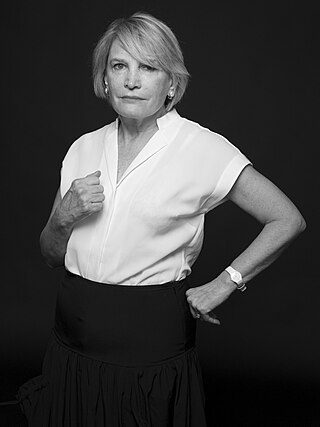
Janet Benshoof was an American human rights lawyer and President and Founder of the Global Justice Center. She founded the Center for Reproductive Rights, the world's first international human rights organization focused on reproductive choice and equality.
The United Nations Entity for Gender Equality and the Empowerment of Women, also known as UN Women, is a United Nations entity charged with working for gender equality and the empowerment of women. UN Women is charged with advocating for the rights of women and girls, and focusing on a number of issues, including violence against women and violence against LGBT people.
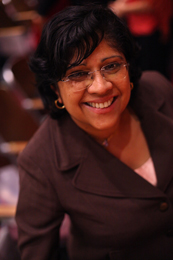
Radhika Balakrishnan is the faculty director of the Center for Women's Global Leadership at Rutgers University. Currently, she serves as the Chair of the Board of the United States Human Rights Network and Chair on the Board of the Center for Constitutional Rights, Commissioner for the Commission for Gender Equity for the City of New York, and President of the International Association for Feminist Economics (IAFFE) for 2020-2021.

The Gender Equality Architecture Reform (GEAR) campaign was a network of over 300 women's, human rights and social justice groups around the world. The GEAR campaign urged UN Member States and the UN Secretariat to move swiftly forward to create a new UN gender equality entity. GEAR also urges the UN to set up a transparent process now for recruiting the best qualified Under Secretary-General to head this agency. The United Nations must move without further delay to implement changes that it has repeatedly recognized as critical to fulfilling its mandate of working for gender equality as a crucial component of development, human rights, peace, and security.
Ravi Verma is the regional director for the International Center for Research on Women's Asia Regional Office and leads the organization's local and regional efforts on various aspects related to research, providing expertise in building capacity and participating in policy dialogue on issues that include adolescent girls, reproductive health, HIV/AIDS, and gender-based violence.

The Global 16 Days Campaign is an international campaign to challenge violence against women and girls. The campaign runs every year from 25th November, the International Day for the Elimination of Violence against Women, to 10 December, Human Rights Day.
Sister Namibia, formerly known as the Sister Namibia Collective, is a feminist nonpartisan non-governmental organization (NGO) located in Windhoek, Namibia. The organization was established in 1989 on the eve of Namibia's independence from South Africa. Sister Namibia advocates for women's rights and engages in activities that promote full gender equality in a world free from violence, discrimination, and oppression. From its inception, the organization's main function has been to produce Sister Namibia Magazine. In the 1990s Sister Namibia expanded its operations to include educational programs, research, activism, media engagement, and cultural activities in support of women's rights.
Yakin Ertürk is a Turkish former United Nations special rapporteur on violence against women and board member of the United Nations Research Institute for Social Development (UNRISD), and was a professor of Sociology.










